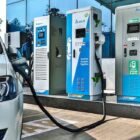Power Up Your Ride: The Benefits Of EV Charging Stations
India, with its prospering populace and quickly urbanizing scene, is at the front of a groundbreaking movement towards economical transportation. Electric vehicles (EVs) have arisen as a vital participant in this progress, offering an eco-accommodating option in contrast to conventional gas-powered motor vehicles. As the reception of EVs picks up speed, the foundation of a vigorous EV charging framework becomes significant. In this blog, we investigate the horde advantages of EV charging stations in the Indian setting, enlightening their positive effect on the climate, economy, and, in general, personal satisfaction.
Natural Sustainability
The preeminent benefit of EV charging stations lies in their commitment to natural supportability. Customary vehicles controlled by petroleum products are critical supporters of air contamination and ozone-depleting substance outflows. The shift towards electric versatility is a promising arrangement in India, where air quality is a squeezing worry in numerous metropolitan regions. EVs produce zero tailpipe outflows, lessening the general carbon impression and further developing air quality. By advancing the utilization of electric vehicles through the organization of charging stations, India can take significant steps towards accomplishing its objectives of ecological maintainability.
Relieving Environment Change
India, in the same way as other different nations, wrestles with the impacts of environmental change. The transportation area, being a significant customer of non-renewable energy sources, assumes a colossal part in fueling these difficulties. EV charging stations, by empowering the reception of electric vehicles, add to relieving environmental change. As the power framework of ccs fast charger in Delhi becomes cleaner and more sustainable power sources are incorporated, the general effect of EVs on diminishing ozone-depleting substance emanations is significantly more articulated. This collaboration among EVs and a cleaner energy matrix positions India as a central participant in worldwide endeavors to battle environmental change.
Monetary Development and Occupation Creation
Putting resources into EV charging foundation likewise achieves financial advantages. The foundation of charging stations makes occupations across different areas, from assembling and establishment to upkeep and backing administrations. As India tries to recuperate from monetary difficulties, the EV area presents a promising road for work creation. Besides, the expanded reception of electric vehicles can decrease the country’s reliance on imported petroleum products, decidedly affecting the equilibrium between exchange and upgrading energy security.
Helping Mechanical Innovation
The arrangement of EV charging stations cultivates mechanical advancement in India. As the interest in electric vehicles and their related framework rises, it animates innovative work in battery innovation, energy capacity, and savvy lattice arrangements. This advantages the EV business as well as adds to progressions in energy proficiency and feasible advancements. By sustaining a culture of development, India can situate itself as a forerunner in the worldwide progress towards cleaner and more brilliant transportation arrangements.
Tending to Metropolitan Clogs and Pollution
One of the primary difficulties faced by numerous Indian urban areas is gridlock and contamination. The far-reaching reception of electric vehicles, worked with by a broad charging station organization, can mitigate these issues. EVs are, by and large, calmer and produce fewer vibrations than customary vehicles, adding to a more tranquil and reasonable metropolitan climate. Moreover, the decrease in air contamination from EVs can decidedly affect the well-being and prosperity of metropolitan occupants.
Boosting Feasible Transportation
The foundation of a vigorous organization of EV charging stations fills in as an impetus for empowering reasonable transportation rehearses. The apparent hindrances to EV reception — like reach tension — are decreased by making the charging framework effectively open. This, combined with solid government strategies and motivations, can speed up the progress toward electric versatility. Impetuses, for example, tax cuts, sponsorships, and special leaving for electric vehicles can improve EVs’ engaging quality, making them a practical and prudent decision for buyers.
Energy Lattice Optimization
Coordinating EV charging stations into the energy network can prompt more effective energy conveyance and utilization. Savvy charging arrangements can empower the enhancement of power interest, considering better administration of pinnacle loads. This upgrades lattice solidness and works with the reconciliation of environmentally friendly power sources. Through a clever lattice of the board, India can guarantee smooth progress toward a cleaner and more practical energy future.
Provincial Charge and Comprehensive Development
While the attention on EVs and charging stations is focused on metropolitan regions much of the time, their arrangement can likewise add to country jolt and comprehensive development. Country areas in India frequently face difficulties connected with power access, so EV charging stations are decisively set up here, in addition to energizing electric vehicle reception. However, it can likewise stretch out admittance to perfect and dependable power. This comprehensive methodology guarantees that the advantages of practical transportation arrive at all sides of the nation, encouraging monetary improvement in-country networks.
Public Mindfulness and Schooling
The foundation of EV charging stations is a visual and substantial sign of the obligation to reasonable practices. This foundation turns into a point of convergence for public mindfulness and schooling about the advantages of electric vehicles. Mindfulness crusades, instructive projects, and local area commitment drives around these charging stations can play a significant part in dispersing legends, tending to worries, and advancing the advantages of electric versatility. Informed residents are bound to embrace the shift towards EVs, making an expanding influence of positive change.
Lessening Noise Pollution
As well as tending to air contamination concerns, the far and wide reception of electric vehicles adds to decreased clamor contamination in metropolitan regions. EVs’ close, quiet activity stands out firmly from the clamor created by conventional vehicles. As additional EVs utilize the roads, the general soundscape of urban areas becomes calmer, improving the personal satisfaction of inhabitants. This perspective is especially critical in thickly populated regions where clamor contamination can unfavorably affect physical and mental prosperity.
Future-Proof Transportation Foundation
Putting resources into EV charging stations is a future-sealing of India’s transportation foundation. As the auto business worldwide turns towards electric portability, a deeply grounded organization of charging stations positions India at the front line of this extraordinary wave. It guarantees that the country’s transportation foundation is lined up with worldwide patterns, making it alluring for speculation, advancement, and joint efforts with global accomplices in the prospering electric vehicle area.




